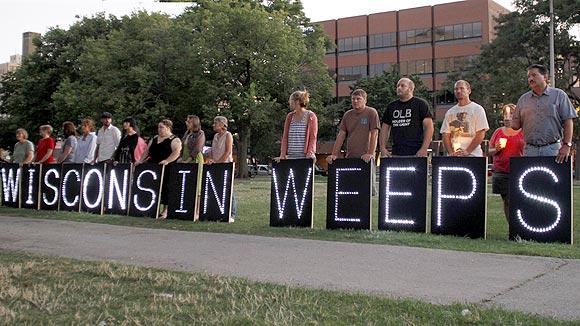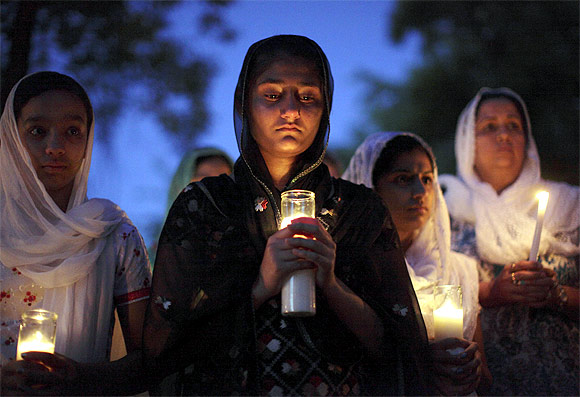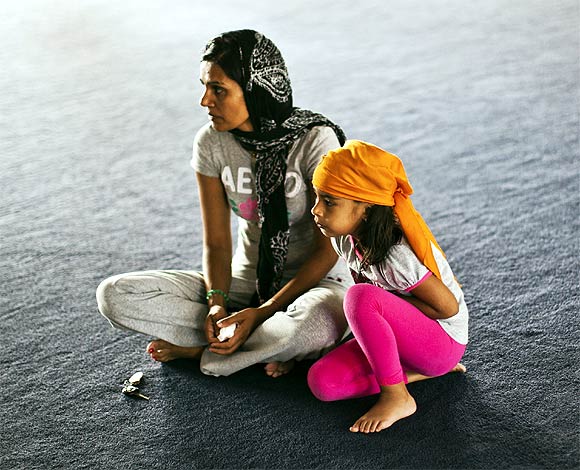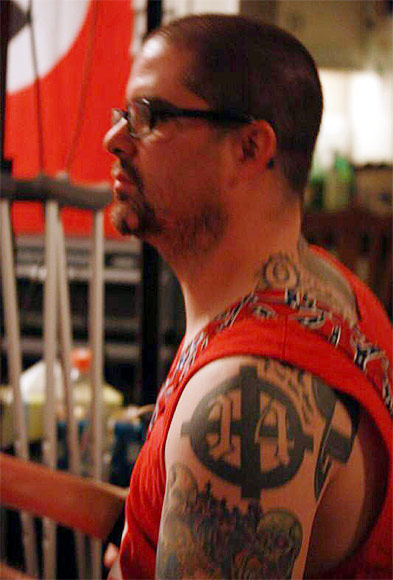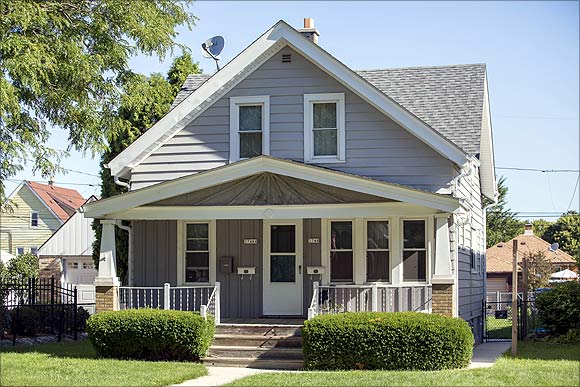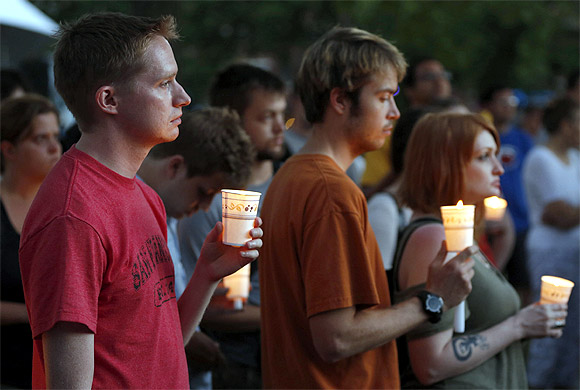 | « Back to article | Print this article |
A deadly mix of white supremacy, ignorance, hatred
The Sikh community, which was already concerned over the spate of hate attacks on individual Sikhs like taxi drivers, gas station attendants etc since 9/11, will be even more concerned over this attack on a congregation of Sikhs in a gurudwara, says B Raman
USA Today newspaper on August 7 reported as follows, "Sikh rights groups have reported a rise in bias attacks since the September 11, 2001, terror attacks. The Washington-based Sikh Coalition has reported more than 700 incidents, which advocates blame on anti-Islamic sentiment. Sikhs don't practice the same religion as Muslims, but their long beards and turbans often cause them to be mistaken for Muslims, advocates say. But the turban also attracts violence to individuals and their places of worship. In the wake of the September 11 attacks, four drunk teenagers set fire to the Gobind Sadan, a Sikh house of worship in Hastings, New York".
From a study of the reports published in the US media, it would appear that since 9/11, there have been two attacks on Sikh places of worship in the United States. The first was the arson in Hastings, NY, which apparently did not lead to any casualties and the second the attack with a handgun on a group of Sikhs who had gathered inside a gurudwara in Oak Creek in the Milwaukee area of Wisconsin on August 5, which led to the death of six Sikhs, four of them turbaned priests. Among those killed was the founding-president of the gurudwara, 65-year-old Satwant Singh Kaleka.
One of those present in the gurudwara told the CNN in an interview that the gunman appeared to be specifically targeting bearded, turbaned members of the congregation and not those who were clean shaven.
He first killed two Sikhs in the parking lot outside the gurudwara, then shot dead four more inside, exited and seriously injured two police officers who had rushed to the gurudwara. He also injured one other Sikh, but it is not known whether he injured him inside or outside the gurudwara. The gunman was ultimately shot dead by one of the police officers.
Click on NEXT for more...
A deadly mix of white supremacy, ignorance, hatred
The gunman used a 9 mm handgun for the killing. From a study of the reports in the US media, he does not appear to have indulged in indiscriminate firing. If it was indiscriminate firing, there would have been more injured people. It was targeted firing directed at Sikhs with beards and turbans.
Speaking to the media, Teresa Carlson, Federal Bureau of Investigation's special agent in charge of the investigation, said the "motive is still being assessed at this time," but the shooting is being investigated as domestic terrorism. The FBI defines terrorism as violence used to coerce a government or civilian population to advance political or social objectives.
Paul Bresson, an FBI spokesman, told the media, "We are looking at hate crime as a possibility. You have a shooting that took place in a house of worship. This was not just a random thing. There's a feeling that this was somehow thought out and targeted."
By the evening of August 6, the gunman was identified as Wade Michael Page, aged 40, originally of Colorado and now living in Wisconsin. According to Lieutenant Colonel Laurel Devine of the Public Affairs Division of the US Army, Page joined the army in 1992 and was discharged at the rank of specialist in 1998. He specialised in psychological operations.
He was posted at Fort Sill in Oklahoma, Fort Bliss in Texas and Fort Bragg in North Carolina. He received several awards, including five achievement medals, two good conduct medals and a parachutist badge.
In a press statement, Page has been described by the Southern Poverty Law Centre, a non-governmental organisation which maintains a database of white extremists, as "a frustrated neo-Nazi who had been the leader of a racist white-power band." The centre, which reportedly has a database of more than 20,000 people it has identified as white supremacists, neo-Nazis and other members of hate groups, said Page figured in its database since 2000.
Click on NEXT for more...
A deadly mix of white supremacy, ignorance, hatred
According to Heidi Beirich, of the Southern Poverty Law Center, in 2000, Page came to its notice for the first time when he tried to purchase unidentified materials from National Alliance, a neo-Nazi group that influenced Oklahoma City bomber Timothy McVeigh. He was subsequently noticed associating himself with some music groups that propagated "hate music". Among such groups were two called Youngland and End Apathy.
According to her, Page used to write for a white supremacist website called Storm Front under the name of Youngland. His groups played at music festivals meant for white supremacists, skinheads and neo-Nazis. His band played in a festival called Uprise in 2010 and he attended other festivals including Hammerfest, one of the largest festivals.
She said that the number of hate groups operating in the US has increased since Barack Obama was elected President in 2008.The number of hate groups identified by her organisation has gone up from 602 in 2000 to 1018 last year.
In an interview in April 2010, Page said he started his band End Apathy in 2005 out of frustration that "we have the potential to accomplish so much more as individuals and a society in whole."
He added, "The concept was based on trying to figure out what it would take to actually accomplish positive results in society and what is holding us back. A lot of what I realised at the time was that if we could figure out how to end people's apathetic ways, it would be the start toward moving forward. Of course after that it requires discipline, strict discipline to stay the course in our sick society."
According to Marc Pitcavage of the Anti-Defamation League as quoted by USA Today, Page also was a member of the Hammerskins, "one of the oldest hard-core racist groups" in the country. The music groups with which he was associated were affiliated with the Hammerskins.
Click on NEXT for more...
A deadly mix of white supremacy, ignorance, hatred
The USA Today quotes Pitcavage as stating as follows: "Page had a number of tattoos identifying him as a skinhead and neo-Nazi. There was a tattoo of a cog that included the number 838, which means 'Hail the crossed hammers', a skinhead slogan. There also was a tattoo of a Celtic cross with the number 14, a reference to the 14-word white supremacist slogan: 'We must secure the existence of our people and a future for white children'. He also had a tattoo of a totenkopf, a death's head or skull, which is a neo-Nazi symbol that shows allegiance to the white supremacist movement."
Analysts in US media attribute the increase in the number of white extremist hate groups to the following factors. Firstly, the propaganda carried on by white extremists that by 2040, immigrants from Latin America will constitute the majority of the US population. Secondly, the belief of white extremists that an increase in the vote bankof the blacks and other minorities contributed to the victory of Obama in the Presidential election. Thirdly, unemployment. Economic distress adds to the anti-minority anger of the white extremists.
What has been the contribution of the post-9/11 anti-Muslim suspicions and prejudices to the growth of hate groups? This has not been adequately analysed though this too must be a factor. The increase in hate crime against the Sikhs could be attributed partly to economic and partly to religious factors. The economic factor being jealousy over the prosperity achieved by them and the religious factor the inability of sections of the population -- even people not identified with white extremists -- to distinguish the Sikhs from the Muslims.
Initial reports of the attack spoke of the possibility of there being more than one perpetrator. Now, the police seem to believe that there was only one. Was it a lone wolf attack or was it an attack motivated by an organisation or group spreading hatred against Sikhs? The indications till now are that it was probably a self-motivated lone wolf attack.
If the observations of a clean-shaven Sikh who was interviewed by the CNN -- that Page seemed to be targeting turbaned Sikhs -- are correct, there would be a greater possibility of the attack being due to religious bias than economic anger.
Click on NEXT for more...
A deadly mix of white supremacy, ignorance, hatred
It needs to be added that most of the details carried by the US media regarding Page's links with white extremist groups as mentioned above have come from non-governmental research groups monitoring white extremist activities and not from the police. CBS TV channel, citing unnamed sources, said evidence suggested race or ethnicity might have played a role in the violence, but it added no links to extremist groups have been confirmed.
The Journal Sentinel of Milwaukee reported that Page apparently worked as a truck driver with Granger, Iowa-based Barr-Nunn Transportation, from about April 2006 to August 2010.
An employee at the company reportedly told the newspaper that Page left "involuntarily" but declined to elaborate. The only criminal information it had on Page was one of issuing a cheque in October 1997 which bounced, it said.
The incident has not revived the debate on the need for effective gun control in the US. Many states allow unrestricted open carriage of guns. Some states do impose restrictions on concealed carriage.
However, it is so easy to buy and possess guns without effective background checks. A gun is seen as a weapon of self-defence and political leaders do not want to impose controls on the right to protect oneself by acquiring a gun. The argument that many of the guns are used not for self-defence, but for killing others in anger or hatred or in outbursts of irrationality, has not made much of an impact either on large sections of the political class or on the pro-gun lobby. It is futile to expect that the massacre of the Sikhs could have any impact on the debate on this subject.
Click on NEXT for more...
A deadly mix of white supremacy, ignorance, hatred
The Sikh community, which was already concerned over the spate of hate attacks on individual Sikhs like taxi drivers, gas station attendants etc since 9/11, will be even more concerned over this attack on a congregation of Sikhs in a gurudwara resulting in multiple fatalities.
There are already reports of unhappiness among members of the Sikh community in the US over what they view as the apathy of the authorities of the two countries in the light of continuing attacks on individual Sikhs and their failure to protect them.
The police may have difficulties in protecting individual Sikhs subject to surprise attacks in public places, but the Sikhs will not be able to understand the inability of the police to protect them when they are in groups in places like gurudwaras. There are already suggestions for increased police patrolling of areas where gurudwaras are located.
Posting of static guards in places where Sikhs gather for prayers and other religious and social occasions should be possible. It is estimated that there are nearly 120 gurudwaras and other Sikh places of worship in the US. Providing them effective protection should be possible. The government of India should take this up with the US authorities.
It is also necessary for the Sikh community to interact frequently with non-Sikh communities, particularly whites, in the US in order to remove wrong perceptions regarding Sikhism.
Click on NEXT for more...
TOP photo features of the week
Click on MORE to see another set of PHOTO features...
